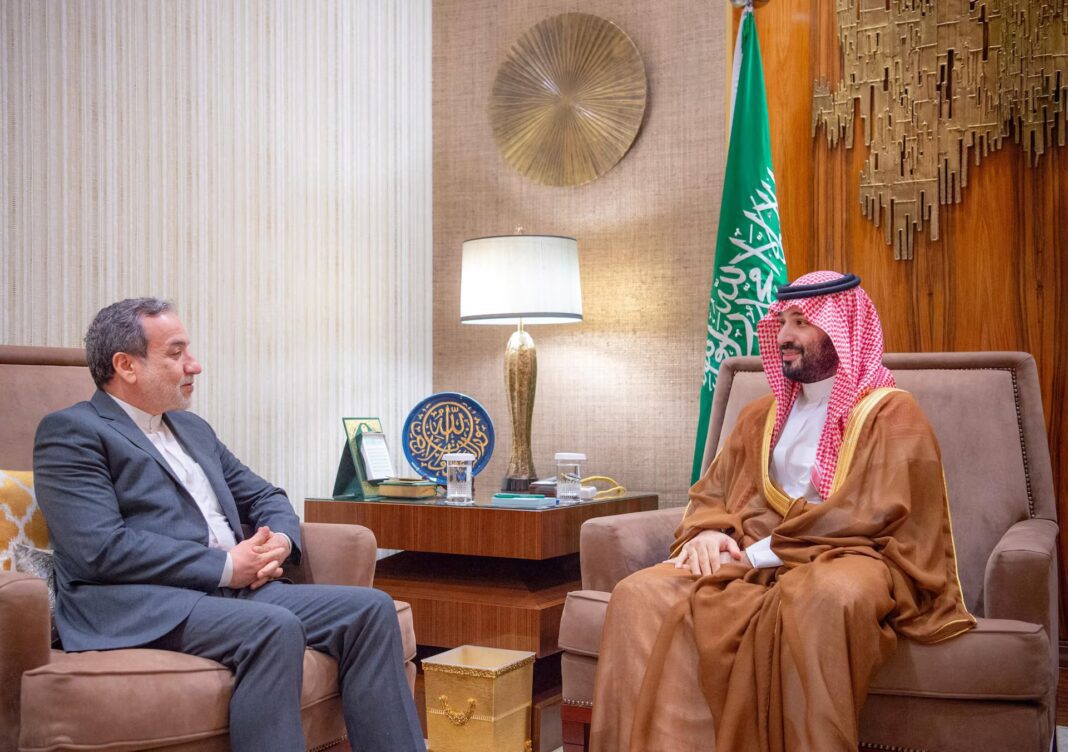Riyadh, Saudi Arabia – A Critical Meeting
Saudi Arabia and Iran, two of the most powerful nations in the Middle East, took another step toward addressing regional conflicts. On Wednesday, Saudi Crown Prince Mohammed bin Salman and Iran’s Foreign Minister Abbas Araqchi met in Riyadh to discuss the tense situation across the region. The meeting was a significant moment in ongoing efforts to reduce hostilities between the two countries, though tensions remain high.
The Saudi state news agency (SPA) reported that the two leaders focused on current regional developments. While relations between Saudi Arabia and Iran have improved over recent years, the two nations still face challenges in fully normalising ties.
Political Rapprochement Amid Difficult Relations
Saudi Arabia and Iran have been moving towards a political rapprochement, which has reduced some regional tensions. This shift comes after decades of rivalry. However, despite these efforts, their relations remain far from smooth. Both nations have deep-rooted differences, particularly over issues like influence in the Middle East and support for opposing groups in conflicts like those in Yemen, Syria, and Lebanon.
Nevertheless, the meeting between Crown Prince Mohammed bin Salman and Foreign Minister Araqchi was seen as a positive step. The conversation focused on finding solutions for conflicts that have plagued the region, including Lebanon and Gaza.
Key Issues: Lebanon and Gaza Conflicts
One of the major points discussed during the meeting was the ongoing conflict in Lebanon and Gaza. Iran’s retaliatory missile strike and Israel’s recent aggressive measures have caused tension in the Middle East. Iran responded to Israel’s escalation of Hezbollah, a terrorist organisation supported by Iran in Lebanon, with the missile strike. This conflict is running parallel to the Gaza war, creating a highly volatile situation.
Foreign Minister Araqchi’s visit aimed to address these issues, particularly the need for a ceasefire. Iran wants to ensure that tensions do not escalate further. The visit to Saudi Arabia also sought to encourage a joint effort between the two countries in stabilising the situation in these war-torn areas.
Iran’s Warning to Gulf Arab States
While Iran’s visit to Saudi Arabia aimed to de-escalate conflicts, Tehran has not hesitated to issue strong warnings to its neighbors. Earlier this week, Iranian officials sent a clear message to Gulf Arab states. They warned that it would be “unacceptable” if these states allowed their airspace or military bases to be used against Iran. Tehran’s senior officials made it clear that any such action would prompt a swift response from Iran.
This message came after reports indicated that some Gulf states might permit the use of their territories for military operations against Iran, a possibility that has heightened tensions in the region. Iran’s stance has been firm, and it is determined to protect its sovereignty and influence in the Middle East.
Araqchi’s Diplomatic Tour: Next Stop, Qatar
Following his discussions in Saudi Arabia, Iranian Foreign Minister Abbas Araqchi is set to continue his diplomatic efforts with a visit to Qatar. Qatar has played a key role in mediating various conflicts in the region and maintains good relations with both Saudi Arabia and Iran.
The visit to Qatar is part of Araqchi’s broader effort to gather support from neighboring countries. Iran hopes to rally the region behind its call for a ceasefire in Lebanon and Gaza. While the situation remains tense, diplomatic moves like these are critical in preventing the conflicts from spiralling further out of control.
Waiting for Israel’s Response
The entire region is on edge as it waits for Israel’s next move. Israel has yet to respond to Iran’s missile strike, which has further fueled speculation about whether the conflict will intensify. Any further military action from Israel could have serious consequences, not only for Lebanon and Gaza but also for the broader Middle East.
Iran’s missile strike was carried out in retaliation for Israel’s actions against Hezbollah, a group that has long been supported by Iran. The situation in Lebanon, particularly, remains fragile as both sides prepare for potential escalation. Meanwhile, Gaza continues to suffer from the ongoing war, with civilians caught in the crossfire.
Efforts for Peace and Stability
Despite the heated atmosphere, both Saudi Arabia and Iran have expressed a desire for peace. The discussions between Crown Prince Mohammed bin Salman and Foreign Minister Abbas Araqchi focused on finding a path forward that would ensure stability in the region. Both nations have a vested interest in preventing the situation from worsening.
Saudi Arabia has taken a leading role in promoting calm and stability in the Middle East. As the region’s top oil exporter, the Kingdom has significant influence over regional dynamics. The country’s efforts, in coordination with Iran, aim to reduce hostilities and create an environment where diplomacy can prevail.
The Road Ahead
The outcome of this meeting is still uncertain, but it represents an important moment in the Middle East’s ongoing struggle for peace. While Saudi Arabia and Iran have made strides toward easing tensions, the path ahead remains difficult.
The conflicts in Lebanon and Gaza continue to pose major challenges. Both Saudi Arabia and Iran must navigate these challenges carefully to avoid further escalation. For now, all eyes are on Israel’s response and how the situation will unfold in the coming days.
As the region waits, the hope is that diplomacy will prevail over aggression, leading to a more stable and peaceful Middle East. The conversations between Saudi Arabia and Iran offer a glimmer of hope, but the road to lasting peace remains long.

